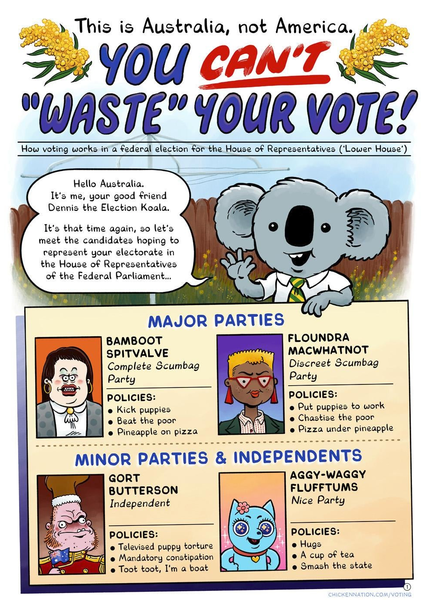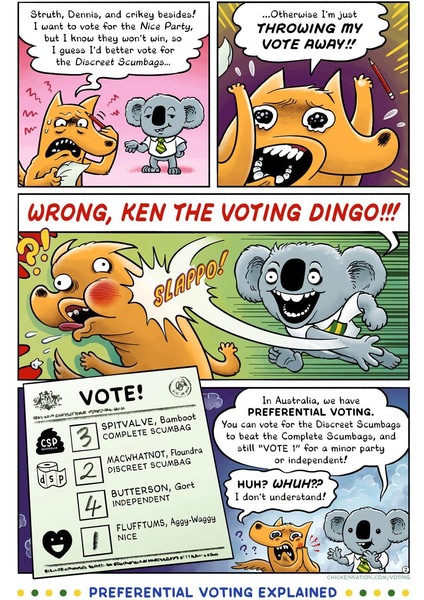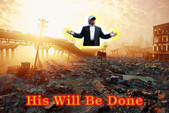Where
do you start talking about American politics?
Where do you end?
You
can enter and exit at any point in the vacuum of the space-time
continuum like a neutrino, heard by nobody and affecting nothing.
The
great wasteland of American politics in the 21st century
is that way because of the polarized division of everything into two
opposite parties. It is an extreme polarization because both parties
and all of the politicians in them keep discovering that they can say
and do anything and still get elected by their party. Given this
off-the-rails behavior, the two parties have arbitrarily occupied the
two most vapid niches that any political party in history has ever
occupied. They are:
- Anti-society (Republicans)
- Pro-society (Democrats)
Furthermore,
nothing much changes no matter which party has the majority, since
they hold everything in deadlock. Other countries stand in amazement
at the state of the US, but they have to understand one crucial
thing: it's all talk.
We just witnessed four years of Trump, the most destructive possible despot you could have and still come out of it with a democracy. And yet most American lives didn't change much. We
even had an insurrection and the average American is barely bothered by it.
The
new president, Biden, has paid Americans directly with thousands of
dollars in stimulus money to help them recover from the pandemic.
Americans barely notice this, too.
See
this kid? Imagine her in a soundproof isolation booth while she has
an imaginary tea party with her imaginary friends. That is what a
politician is to the average American.
There
is a massive disconnect in the democratic system in America, which
comes from no education for the public. There are no civics classes,
history is a dead subject, and the average American doesn't even vote
and doesn't pay attention to political news, even if nuclear bombs
fly overhead.
Twenty years ago we lost a few thousand lives in 9/11 and the entire nation had a decade-long panic attack. But now, even if one president sat back and allowed the COVID-19 pandemic to wipe out half
a million American lives and the next president stopped
the pandemic almost by snapping his fingers, neither stimulus shows a response from the cadaver of the American spirit.
The most shocking news that you can tell any American currently under the
age of 40, is that things were not always this way. And that things
will not stay this way either.
The Two American Parties Represent Almost No One
Recall the point I keep circling back to again and again. A huge chunk of Americans don't even vote. I used
to say "less than half of Americans vote," which was true
up until 2020. But holy flaming toast, Americans in 2020 actually
showed up to the primary to the tune of 2/3rds of eligible voters. A
record-breaking year!
After
four decades of ~50% apathy from the American public, 2020 was a
crappy enough year that at least 60% (estimates up to 67%) of the eligible voting population could bother to stir their buns off the couch long enough to fill out a ballot. I guess half a million Americans dropping dead did have some impact after all! On ~16% of the people, that is.
What
would it take for the remaining 33% to vote? A volcano erupting from
the floor of their living room, as lava sharks crashed through the
windows and chased them around, before they fled outside and were
devoured by clockwork giant alien buzzards with lasers, under a hail
of chicken shit brimstone. I don't know, I'm just hazarding a guess.
In December of 2020, right after the election but before the January 6th insurrection, NPR
polled those people who did not vote and asked them, for crackers' sake, why?
The answer came to "not registered," "not interested,"
"not liking the candidates," "feeling they wouldn't
make a difference," "undecided."
Imagine that. Donald Trump. Joe Biden. One-third of Americans can't tell these two people apart. This is why I applaud Biden's stimulus check plan. Finally, a direct way to tell the candidates apart. Perhaps Pavlovian
conditioning of American people will help them draw the connection between coloring in the little boxes on the paper and getting treats afterwards.
OK,
but why are these people so disengaged? Medill News Service digs into
this question in a couple more outstanding articles which I commend
to your attention, "Nonvoters
2020: Counted Out" and "Do
politicians care about people like me? Nonvoters say no."
Zoom in on the former article which shares this interview:
> "Anna Rasmussen of Tacoma, Washington, another nonvoter who participated in the survey, said she didn’t agree with any of the candidates and had no options: She didn’t want to vote for a Democrat because she is anti-abortion, but 'a lot of Republicans are anti-immigrant or anti-LGBTQ so I can’t vote for a lot of them.'"
Well
then, it seems Mrs. Rasmussen has fallen into a political crack.
There is no party for pro-life immigrant LGBTQs.
The
second article makes this point even more clear:
> "One solution nonvoters embrace is increasing the choices on the ballot. Sixty-four percent of nonvoters agree there should be a third major political party."
Just below that is an interview with a self-identified Democrat who says he would have voted had Bernie Sanders won the Democrat primary but declined once he saw Biden nominated. He described Biden as "a career politician who hasn’t been able to get much done." Presumably, he thinks Sanders dabbles in Congress for a hobby.
But here is our true answer to the question "why don't Americans get off their ass and vote?" Simple
Gallup polls checking voters' claimed identity.
Democrat and Republican float around between the twentieth and
thirtieth percentile, only rarely breaking through 30%. But the
middle column, described as "Independent," runs in the
30-50% range, usually mid-45%-ish.
Wait a minute. Do you mean to tell us that neither the Democrats nor the Republicans hold the majority in this country? That the true majority party in the USA is "independent"? That both an all-Democrat and an all-Republican administration will only please, at the very most, about ~31% of the people?
Isn't
that amazing?
The
news media never tells us this story!
All you hear about is blue-state / red-state, left-right, Spy-vs.-Spy. They speak to a minority of us, both sides. The truth, the actual truth, is that a bunch of us are all Mrs. Rasmussen. We don't want either of the shrink-wrapped Spam options, we want our own parties!
What
we all are is disenfranchised. Me, personally, I'm mostly a
pinko-liberal, but there are some parts of the party line I don't agree
with. I just go along with it because the other side is even crazier.
Everybody I talk to, hardly any of them is hard-line one party or the
other. Most of them shrug and check the box for the closest thing to
what they want and hope for the best. Those of you who vote, doesn't
it feel like you've been doing that for your whole lives?
We Need More Parties!
As
the above video indicates, things were not always this way, but they
were always nearly this bad. We have had other political parties in
our system before, but we always seem to gravitate around two.
Besides Democrats and Republicans, we have also had the Whig,
National Republican, Democrat-Republican, and Federalist parties.
Here's
our fall-back on clear politics tutorials, Crash Course:
Now,
we have seen that this situation pervades pretty much all of US
history. We have parties because anything else is just too messy to
consider. The previous video talked about the infamous Ross Perot
run, the closest a third-party candidate has ever gotten to tasting
Oval Office leather. But what do you do instead of a winner-take-all
decision? Put all three in office but give each of them decision
power in proportion to their share of the popular vote?
We are all familiar with how Bernie Sanders split the Democrat ticket, tragically in 2016, less damaging in 2020. But Sanders has no business calling himself "Democrat" at all. He is a self-described Democratic
Socialist. He functions as an Independent when
not running for president. If we were afforded a
Democratic-Socialist party in this country, we would have had Sanders
in, no contest.
Likewise, Ron Paul split the Republican ticket back in 2008. Ron Paul is often
cited as a Libertarian. But of course, when he
runs for president, he has to put on the Republican hat. In 2008
election, he lost the Republican nomination to John McCain, who
figures into our next example…
John McCain was vocally critical of Donald Trump while he lived, and Trump
fired back every chance he got. Hey, but they're both Republicans! Shouldn't they get along? Not exactly. McCain, leaning closer to Conservatism, is often
said to be the last of the "old Republican party," while Trump belonged more to the… ah… Tea
Party perhaps? Right here on 123ish, see "John
McCain: The End of Civil Politics?"
So the reality is that even when we vote D/R, we're not necessarily picking a side anyway. We might see the election of Biden over Sanders as the Centrist party beating out the Socialist party, rather than the Democrats picking a candidate. Trump's nomination was the Tea Party beating the Republicans. And so on. We have various coalition mini-parties
within the two major parties anyway.
In everything but the place where it counts: On the ballot!
What
would it look like if the political spectrum for major offices
(presidents, governors, senators, and representatives at the federal
and state level) had a more diverse offering of parties? Something
like this:
Green
/ Socialist (hard left) | Democrat (moderate left) | Republican /
Conservative (moderate right) | Libertarian (hard right)
That seems to be more what John Adams would have preferred, at least. Spoilers: This set-up wouldn't solve everything. But there are democracies
with multi-party systems, and they have made it
work. For instance, ranked-choice voting:
For one thing, multiple parties over two parties breaks up the
infamous deadlock. Since no party ends up a majority in places like a
house of representatives or parliaments, multiple individuals have to
compromise across party lines.
It
might be that time in America. We are seeing increased restlessness
within both parties. The parties have changed before. We're still a
young country, still figuring out how to work this democracy thing
out.
Final thoughts on political polarization
We
turn to the excellent historian-documentarian David Hoffman, who has
one of the most rocking YouTube channels you should go check out.
It's illuminating to compare modern YouTube comments to clips from
the 1950s-1990s. Here's one clip that shocked a generation on that
channel:
At
about 8:19 we get to the money quote, where this lifelong Social
Security administrator shares how there was "very little
politics" in Social Security at that time. Social Security was seen as a
basic government function, something essential no matter who won the
last election. This interview in 1979 was originally about the
transition from the Industrial Age to the Information Age. But this
administrator's whole attitude feels like it came from a different
planet compared to now, doesn't it?
Compare to now, where merely holding an election and counting the ballots is this radical, left-wing, pinko thing to do. Everything is painted as Socialism by the MAGA crowd. As
I point out last time, the MAGAs are LOSING. That's why they are so hateful. Remember the Gallup poll back there, Republicans are at 25% and not all of them are slobbering MAGA idiots. Less
than half of them are Trump-loyalist MAGAs. So that is about 1/8th, 12% of the country.
There is actually no polarization in this country now. There is instead 88% of us uniting and pulling together to move forward with progress and civilization, and 12% little angry balls of hate who want to blow it all up. They never close their mouths and have help from Russian
troll farms so they sound louder, but it really is a case of a few bad apples - which happen to enjoy grossly over-inflated representation as 50% of our government thanks to the bad apples' openly terrorist tactics.
But getting back to 1979, and keeping politics out of government, the polarization of the parties was just drawn along different lines back then. Everybody agreed that a civilization needs basic functions to survive. Differences were over things like who can fund it or who has the best solution.
Richard
M. Nixon, the poster child for Republican presidents, right?
What
if I told you that Nixon championed and signed into law the
Environmental Protection Agency, the Clean Air Act, the Clean Water
Act, and the Endangered Species Act? How about Nixon's Social
Security amendments, which extended Medicare to people under age 65
with disabilities? How about that Nixon created OSHA, the
Occupational Safety and Health Administration, and the Consumer
Product Safety Act?
Heck, that's still barely scratching the surface. Nixon, "tricky Dick," who would go on to be the most hated American politician for a whole generation until the end of the 20th century, had free reign to enact all these "Socialist big government" programs as a Republican, and nobody in his party complained!
THAT
is how far things have been warped. Obama fought eight years for
basic health care and a few token issues he managed to slip under the
radar, legalizing gay marriage and starting the ball rolling to end
marijuana prohibition. He had no end of Republicans nipping at his
heels about it.
On
the other hand, some polarization may be necessary. When we don't
have polarized ideas, that may be because we're all united on one
ideal - which isn't any good if the ideal is rotten. In 1979, Obama
never would have had the same fights. The health care would have gone
through with little to no argument. On the downside, gay marriage and pot
would not have even been a raised issue in that time period.
You
would have drawn shocked gasps then at the mere notion of gay
marriage or legalized pot in the mid-20th. You also would have drawn shocked gasps
at that MAGA idiot's car driving around with a death threat painted
across the back in neat lettering (aw, he starred out the F-word, how
considerate!).
Things have changed, even drastically in the space of a lifetime. They can change some more.





































